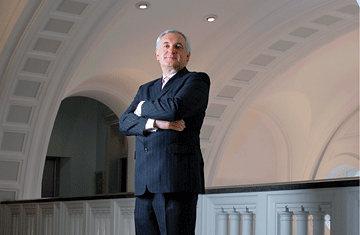
Irish Premier Bertie Ahern.
The feverish betting has been sparked by intense speculation about the fortunes of Bertie Ahern, the leader of Ireland's largest party and seeker of an unprecedented third successive term as Taoiseach (prime minister). Five years ago, the gamblers weren't interested because Ahern was a racing certainty to be returned to office, so big wagers could turn into only minuscule wins. This time the field was wide open: Ahern was contending with intense media scrutiny of his personal finances and criticism of his government's efforts to improve the poor state of the country's health service. There were even concerns about whether the Irish economic boom — the so-called Celtic Tiger — is on the wane, though the queues at the bookmakers suggest some voters still have money to burn.
In the event, Ahern still turned out to be the greatest asset for his party, Fianna Fail. A relentless campaigner with a flair for projecting himself as an ordinary guy — the entire country seems to be on first-name terms with him — he also earned the nickname "Teflon Taoiseach" by sliding away from a web of corruption scandals without a stain. Over the past three weeks he pulled out all the all the stops and called in favors from old friends. Bill Clinton and British Prime Minister Tony Blair endorsed him in a campaign video and he cleverly timed plaudits for his central role in the Northern Ireland peace process to maximize publicity.
The bookies ended up reversing their odds, and a big turnout of voters seems to have pushed Ahern ahead in the home stretch. An exit poll by the state broadcaster, RTE, predicts 41.6% of the vote for Fianna Fail, which is probably enough to enable Ahern to form a new coalition. Power is certainly convinced Ahern will pull it off. Before counting began the bookmaker announced he was paying out to gamblers who wagered on Ahern remaining Taoiseach.
That could still be a costly mistake. Now that the horse race is done, the horse trading begins. The exit poll also predicted an improved performance for Ahern's biggest rival, Fine Gael leader Enda Kenny, and it may be days or weeks before the entire composition of the new government is known. Ireland's proportional representation system means transferred votes take a long time to count. It also makes it difficult to win an outright majority in the Dail, the Irish parliament, so the large parties will need to look for support among the four smaller parties to form a ruling coalition.
This means a lot of promises will be made behind closed doors, about government positions and policies. The economy won't be the only issue being bartered by potential partners in government. Health care, the environment and even an end to the use of Shannon airport by the U.S. military could be up for grabs. Nationalism may also be a central issue for the first time in decades. Most parties in the Irish Republic have a historical aspiration for the reunification of their country with Northern Ireland. Sinn Fein, which in this election drew attention not as a radical fringe party linked to the IRA but a political force that might emerge holding the balance of power, will try to use its handful of seats to turn that aspiration into something tangible.
In March Sinn Fein became part of the new Northern Ireland government. The party has also cleverly expanded in the southern part of Ireland by mining latent or marginalized voters — young people, urban poor, environmentalists, and anti-war campaigners. If they can become the first party to be in both of Ireland's governments, they'll be in a position to harmonize policies and blur the border between the two parts of the island. They'll also demand that Ahern deliver a policy paper on making Irish unity a practical reality.
Before the election, Ahern said he's not interested in a partnership with Sinn Fein, but its leaders went ahead regardless and set up a negotiating committee to put forward their terms for government. If they have the seats Bertie needs, they're betting he'll be ready to make a deal.
